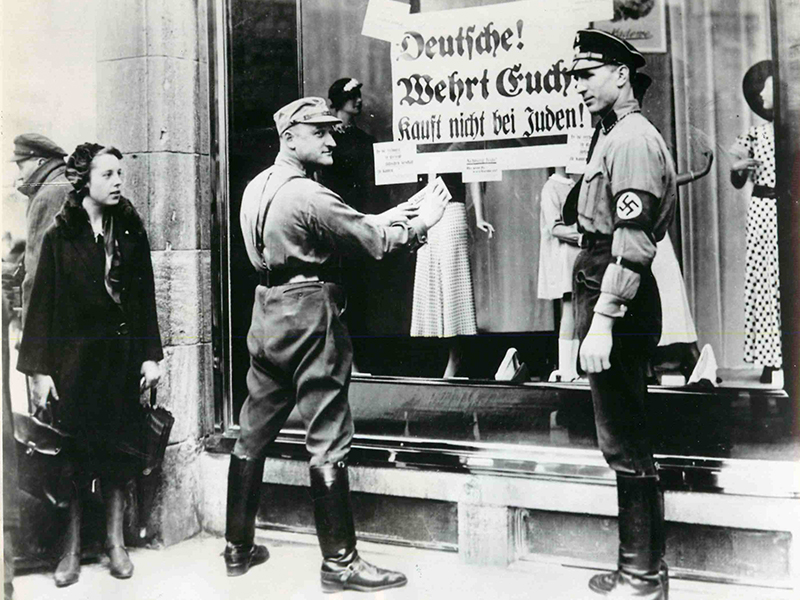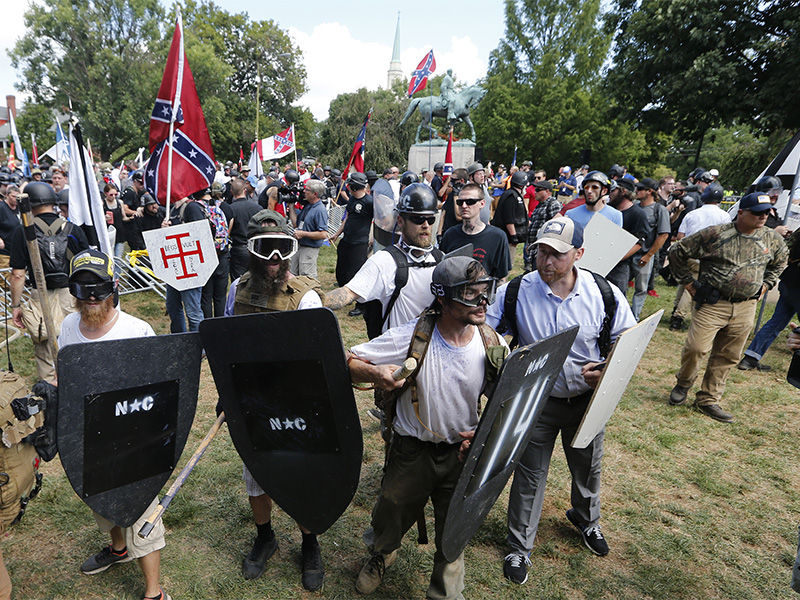
(RNS) — I’ve taught my six-year-old son not to take the Lord’s name in vain this way: We should only talk about God, I tell him, when we’re actually talking about God. Not when we’re surprised at the plot of a TV show, not when we’re frustrated with our Legos, but only when we’re talking about, or to, God.
I feel the same way about the term “Nazi.”
As a Jew, it makes me uncomfortable to hear the term used casually in descriptions of the hateful white supremacists who marched and attacked in Charlottesville, Va., and whose presence persists in news headlines, social media threads and late summer conversations.
[ad number=“1”]
I try in my life to protect the language of the Holocaust — you won’t hear me laugh at “The Soup Nazi” episode of “Seinfeld” or refer to a ticket-happy parking cop as “the Gestapo.” And I had mixed feelings about the statement Billy Joel was trying to make when he wore a yellow Star of David during a Monday (Aug. 21) concert.
But the torch-wielders are not true Nazis — they are neo-Nazis, even those who openly admire and emulate the ideology of Hitler’s Nazism and brandish its flag. The Nazi political movement was a discrete historical occurrence that began, thrived for a tragically long period of time, and was defeated. Calling today’s marchers Nazis neither respects history nor is particularly helpful in stopping us from repeating it.

White supremacy demonstrators clash with counter-demonstrators at the entrance to Lee Park in Charlottesville, Va., on Aug. 12, 2017. (AP Photo/Steve Helber)
For one thing, some of the marchers take the term literally, pointing to the need for us to do the same. Peter Tefft, the Charlottesville marcher who was publicly renounced by his family, has declared “Nazi” to be a racial slur against whites because not all of his compatriots are “National Socialists.” At least in the twisted opinion of that one hateful man, Nazism is a specific ideology, not to be generalized.
But the term “Nazi” can, when wielded precisely and accurately, illuminate the starkness of exactly what’s at stake as white supremacist, white nationalist, and other racist ideologies become increasingly empowered in a political culture rife with moral equivocations.
[ad number=“2”]
Jelani Cobb, a professor of journalism at Columbia University, argues for the term’s use because of its universal power. He told Slate in an interview that “‘Nazi’ is the only unqualified evil,” and therefore is the most efficient way to capture people’s emotional and political attention and highlight the horror of the racists’ behaviors and rhetoric. He argues that Americans feel comfortable unequivocally rejecting all things “Nazi” because part of the American identity is pride in having defeated it. “This country doesn’t feel personally implicated in the evils of Nazism,” he said. “We are able to denounce it with a clear conscience.”

A Nazi rally in Berlin in 1936. Photo courtesy of Creative Commons
But while the term “Nazi” may be the straightest line to our hearts and minds, it is also reductionistic in light of America’s history of white nationalism and white supremacy. Lindsey E. Jones, a Ph.D. candidate in history at the University of Virginia, argued a similar point about the events in Charlottesville.
“Yes, there are neo-Nazis in the number here,” she said in a viral Aug. 12 tweet. “But we don’t have to make the colossal reach across Atlantic for examples of white nationalism.”
In other words, for me as a Jew, “Nazi” hits too close to home. But for the broader American population, “Nazi” threatens to take our eyes off the ball.
So I remain uncomfortable calling the marchers “Nazis,” simply because they are technically not members of Hitler’s National Socialist party — I still believe the language of the Holocaust needs to be protected. I do support the use of the term to educate the public about the confluence of micro and macro historic factors that brought the Nazi party into power. And I agree with Cobb that the word can be used intentionally to articulate the imperative to act.
[ad number=“3”]
But the political chaos we find ourselves in makes our word choices matter more than ever, and “Nazi” shouldn’t be a casual catch-all to describe all the bad guys. In other words, let’s only talk about Nazis when we’re actually talking about Nazis.
(Holly Lebowitz Rossi is a freelance writer and former Religion News Service correspondent. She is a graduate of Harvard Divinity School. The views expressed in this opinion piece do not necessarily reflect those of Religion News Service)
